
by: SEO Strategist
Ashot Nanayan
Ashot Nanayan is the CEO and Founder of DWI and a seasoned SEO strategist. With a proven track record of...
All Articles by Ashot Nanayan
July 27, 2025
7 min. read
On average, an SEO audit can cost anywhere from $300 to $5,000, depending on how deep and detailed it is. Some small websites only need a quick checkup, while bigger or more complex sites need a full, in-depth review. Prices can also change based on who’s doing the audit: a freelancer, an agency, or an SEO expert.
If you’ve ever Googled “how much does an SEO audit cost,” you’ve probably seen a bunch of broad ranges and not much else. I’m going to walk you through exactly what makes an audit cheap, expensive, or worth every penny.
We’ll look at what’s usually included (and what’s conveniently left out), which pricing models make sense, and how to spot when someone’s selling you a checklist versus a comprehensive audit. Whether you’re a small business owner, a marketing lead, or just someone trying to understand what you’re paying for, you’re in the right place. So, let’s get into it.
An SEO audit is basically a full checkup for your website. Just like a mechanic looks under the hood of your car to make sure everything’s running smoothly, an SEO audit looks at all the parts of your site that affect how well it appears in search engines like Google.
It checks things like whether your pages are being indexed, if your keywords make sense, if your site loads fast, and whether anything is stopping Google from trusting or ranking your content.

With a detailed SEO audit, you can also spot missed opportunities. Maybe you’re targeting the wrong keywords, or maybe your site structure is confusing, or you have great content that no one’s linking to. A good SEO audit doesn’t just point out what’s broken; it shows you what you can improve to get more traffic, better rankings, and more conversions.
In 2025, most businesses pay anywhere between $300 and $5,000 for a detailed SEO audit. That’s the average range for small to mid-sized websites. If you’re working with a reputable freelancer or a smaller SEO agency, it usually falls closer to the $700–$1,500 mark. Bigger audits, especially for eCommerce, SaaS, or international websites, can easily cross $5,000, but that’s because there’s a lot more to check and analyze.
Here’s a realistic SEO audit pricing comparison table with accurate data based on industry averages from agencies, SEO experts, and platforms like Clutch, Upwork, and Semrush (2024–2025 trends):
| Plan | Price Range | Delivery Time | Key Features |
|---|---|---|---|
| Basic Audit | $500 – $1,000 | 3–5 business days | Site crawl, on-page SEO issues, speed and mobile checks, basic tech overview |
| Standard Audit | $1,500 – $2,500 | 7–10 business days | Includes technical SEO, on-page + content audit, keyword checks, UX flags |
| Advanced Audit | $1,800 – $4,000+ | 2–3 weeks | Full audit with backlinks, indexation, JavaScript rendering, SEO strategy, competitor and content gap analysis |
The choice between hiring a freelancer or going with an SEO agency can make a big difference in both cost and experience. Freelancers typically charge anywhere from $300 to $1,500 for a full SEO audit, depending on their experience and how in-depth the audit is. If you’re running a smaller website or just need a professional eye on the basics, a well-reviewed freelancer might be all you need, and they usually deliver faster turnaround times, too.
Agencies, on the other hand, often start around $1,500 and can easily go up to $5,000+, because you’re getting a team of specialists, access to premium tools, and often a more structured process. Agencies generally include extras like competitive audits, strategy roadmaps, or ongoing consulting hours.
For more insight into how different models are priced, you can check out our complete breakdown of SEO pricing across services.
In simple words, a one-time SEO audit is like getting a full health check for your website. It usually includes a technical review, on-page SEO analysis, content evaluation, site structure, indexing, and backlink overview. Prices for this kind of audit range from $300 to $5,000 (as I already said), depending on how complex your site is and who you hire.
SEO maintenance is an ongoing service where someone (or a team) keeps an eye on your site month after month. Monthly SEO maintenance can cost anywhere from $500 to $3,000+ per month for an SEO retainer, depending on how hands-on and strategic the work is.

In my opinion, one of the most common misconceptions in SEO is that local SEO audits should always be cheaper than national ones. I mean, usually it’s true, but it’s not a rule. Depending on the complexity of the business, some local SEO audits can be just as detailed and even more challenging than national ones.
A typical audit for a local business with one location might cost between $300 and $1,000, covering local keyword targeting, Google Business Profile optimization, local citations, and NAP consistency (name, address, phone). But things change quickly when the same business has 10, 50, or even hundreds of locations.
In this case, the provider must audit multiple profiles, pages, and directories across cities or even countries. Still not clear? Check out our local SEO packages to get a quick picture.

On the other hand, a national SEO audit starts at a higher baseline, usually around $1,500 and up, because the strategy is broader. It focuses on ranking across the country, often for competitive keywords.
There’s usually a stronger emphasis on content depth, backlink quality, technical scalability, and overall site architecture. Since the audience is wider, the margin for error is smaller. That’s why most national SEO packages come with larger audits baked in.
On average, an enterprise SEO audit costs from $3,000 to $15,000+, and in some cases, it can even cross $25,000. That might sound weird at first glance, but when you break it down, it makes a lot of sense.
First, enterprise websites usually come with thousands, sometimes millions, of pages. It requires a full team of SEO professionals digging into technical SEO, site architecture, indexing and crawl issues, UX and content gaps, internal linking, and complex international SEO setups if the site operates globally. The bigger the site, the more moving parts, and the more hours involved.
| Factor | Impact on Cost | Why It Matters | Example |
|---|---|---|---|
| Website Size | Higher cost for larger sites | More URLs require deeper crawling, analysis, and reporting | 10,000+ pages vs. a 50-page site |
| Technical Complexity | Increases time and expertise needed | Complex architecture, JavaScript, or multiple CMSs take longer | SPA, subdomain structures, multilingual setup |
| Audit Depth | Basic to full-stack impacts pricing | Some audits include just SEO, others also cover UX & analytics | On-page vs. full SEO + CRO audit |
| Industry & Compliance | Heavily regulated sectors cost more | Requires legal, financial, or healthcare-specific review process | Finance, healthcare, and legal websites |
For smaller enterprise sites or those with good SEO foundations, pricing might stay in the $5,000 to $8,000 range. For mid-sized enterprises with known issues and a complex setup, the range typically falls around $10,000 to $15,000. Finally, for massive, international, content-heavy platforms or eCommerce giants, it’s not unusual to see prices reach $20,000+, especially if the audit includes implementation planning, stakeholder workshops, and custom reporting dashboards.
If you want to explore the full breakdown of enterprise SEO costs beyond audits, check out our complete enterprise SEO pricing guide.
Sometimes, add-on costs can quickly appear depending on your site’s needs. These are additional services that extend beyond the audit itself, including technical fixes, consulting calls, CMS changes, and the implementation of recommendations.
For example, if the SEO audit identifies issues that require working inside your CMS or collaborating with developers (like fixing page templates or scripts), this might cost $1,000 to $5,000+, especially for complex setups.
Content Audits or Rewrite Plans: Some agencies separate content audits from technical ones. If your site has thin, outdated, or misaligned content, add-on audits and rewrites can run from $1,000 to $10,000, depending on volume.
To avoid being surprised by inflated or unnecessary charges, request a line-item estimate upfront, or avoid unclear terms like “optimization work” or “advanced fixes” with no explanation; ask what exactly that includes. Make sure you own the audit report and are not locked into paying for implementation through that same provider unless you choose to.
One of the most frustrating parts of hiring someone for an SEO audit is realizing later that the “fixed price” wasn’t so fixed after all. Hidden costs appear when providers don’t fully explain what’s included or, worse, intentionally keep things unclear to upsell you later.

Some common hidden costs include:
Paywalled Recommendations: Some agencies will give you an audit report with findings but hold back the solutions unless you pay for an “implementation package.” You get the “what’s wrong,” but not the “how to fix it” unless you upgrade.
Tool Access Fees: Occasionally, they’ll suggest ongoing access to dashboards or reporting tools that weren’t disclosed upfront, charging extra for something you assumed was part of the service.
Limited Scope Disclaimers: Watch out for audits that seem cheap but only cover a portion of your site (like 10 pages or just technical SEO). Then they’ll charge extra to review the rest.
Mandatory Monthly Retainers: Some freelancers or agencies price audits low but only offer them inside a monthly retainer.
I would highly recommend asking for a full scope document before signing anything. Make sure it outlines what’s included. Next, clarify what deliverables you’ll receive, and avoid suspiciously low prices. For example, if someone offers a full audit for $99, you’re either getting a generic report, or they’re planning to charge later for what should’ve been included.
To avoid these issues altogether, consider working with our transparent and straightforward SEO audit services, where everything is clearly outlined from day one.
I’ve already broken down the different SEO pricing models in detail in my complete SEO pricing guide, and the same logic largely applies here too. I won’t repeat the full breakdown, but when it comes specifically to SEO audits, there are a few important nuances worth talking about.
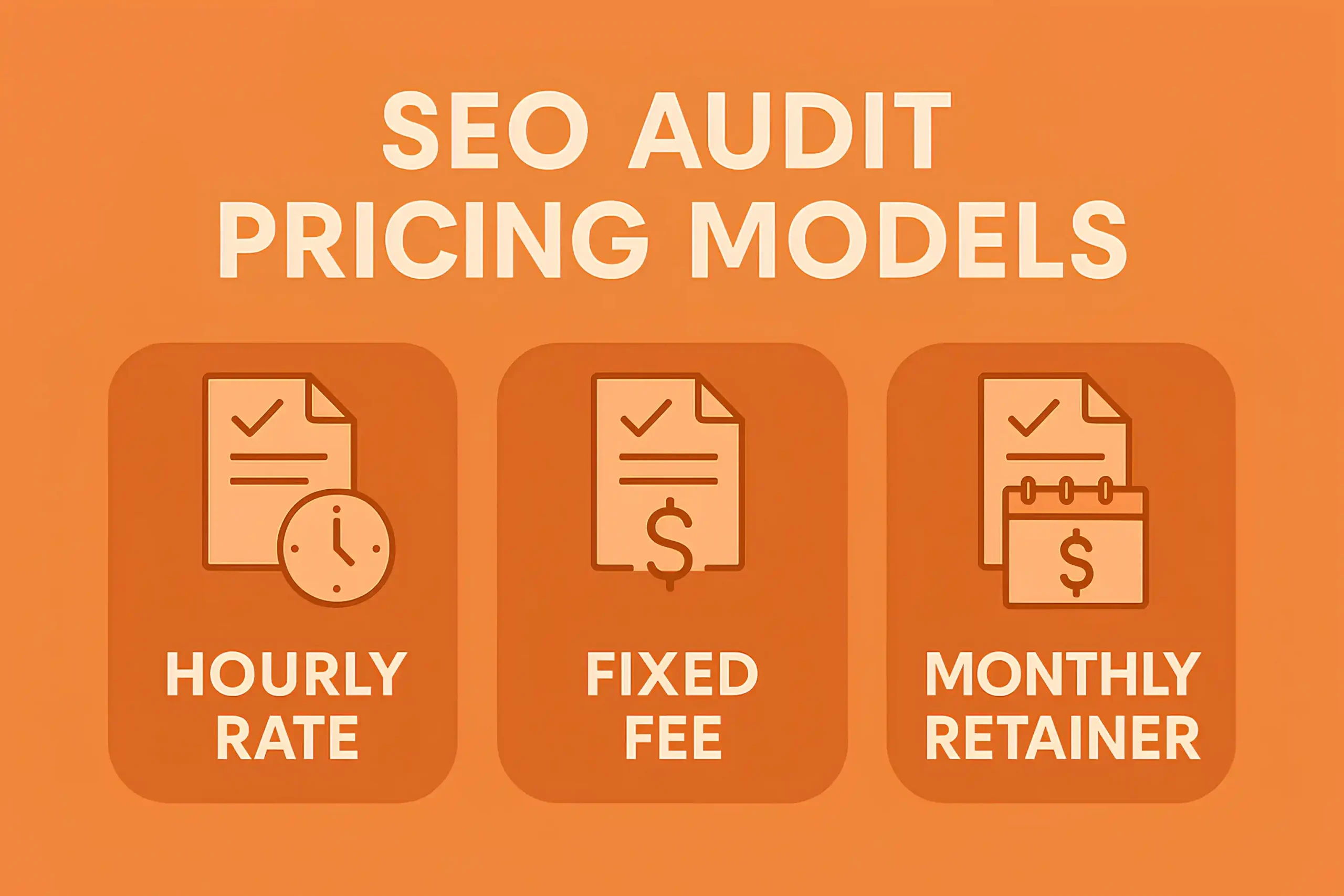
Most SEO audits are priced under one of three models: fixed-price, hourly, or as part of a monthly retainer. For most businesses, a one-time, fixed-price model works best. You pay a set fee, get a clear deliverable, and don’t have to worry about ongoing costs. This is especially useful for websites that just want a second opinion or a health check before making big changes.
But in some cases, especially if the website is massive, messy, or hasn’t been touched in years, hourly pricing can make more sense. For example, if you’re working with a technical SEO expert and expect to uncover a lot of issues that require deep digging, hourly work gives you more flexibility.
Retainer-based audits usually only make sense if the audit is part of a larger SEO service package. You’re paying for ongoing work, and the audit is just the first step. This is more common in enterprise SEO or long-term strategy scenarios, where the audit informs a broader roadmap.
That said, if you’re not ready to commit to long-term, no-contract SEO is also an option. Many providers offer standalone audits without locking you into monthly retainers; perfect for businesses that just need insights without ongoing obligations.
If you’ve ever gotten multiple SEO audit quotes and wondered why the prices are all over the place, you’re not alone. I would say one of the biggest cost drivers is site complexity. I don’t mean like how many pages you have, but how those pages are structured, what kind of tech stack you’re using, whether it’s eCommerce, WordPress, custom CMC; all of it. The more complicated the website, the more time an SEO has to spend just figuring out how your site works before they can even begin the actual audit.
Another big factor is your goals. Are you just looking for a quick health check before a redesign, or do you want a full teardown that includes technical issues, backlink profile audit, content gaps, indexing patterns, and search intent mismatches? A lot of businesses ask for an “SEO audit” when what they really need is a full strategic plan, and that’s a much bigger job.
Of course, there are a lot of other factors, including the number of pages, work scope, your site’s current SEO health, the agency’s or freelancer’s reputation, and so on. Here’s the full breakdown.
| Cost Factor | Influence on Pricing | What’s Evaluated | Typical Impact |
|---|---|---|---|
| Site Size & Structure | More pages = higher cost | Total URLs, depth of navigation, internal linking | Larger sites require deeper crawling and longer analysis |
| Technical Depth | Advanced audits cost more | Core Web Vitals, indexation, schema, JS rendering, mobile issues | Advanced audits involve more manual checks and tools |
| Audit Scope | Broader scope = higher pricing | Whether it covers content, backlinks, CRO, and UX in addition | Full-stack audits go beyond basic SEO elements |
| Experience of Auditor | Top experts charge premium rates | Strategy, insights, prioritization, not just tools | Senior-level audits often save more money in the long term |
Alright, now that pricing is out of the way, let’s talk about what’s inside a proper SEO audit. Some audits are just simple PDFs with a bunch of automated checks, while others are the real deal: detailed, useful, and simple. In the next parts, I’ll break down what a good audit should include, based on how I approach it with my own clients. This way, you’ll know what to expect and what to ask for before spending a single dollar.
Most comprehensive audits include it as a core section. There are many cases where it makes sense to hire someone just for a standalone technical SEO analysis. I’m not going to list every single thing a technical SEO audit usually covers (there are a lot of generic lists out there already). But the price depends entirely on how far you need to go. A basic technical audit for a small site might start around $300–$500.
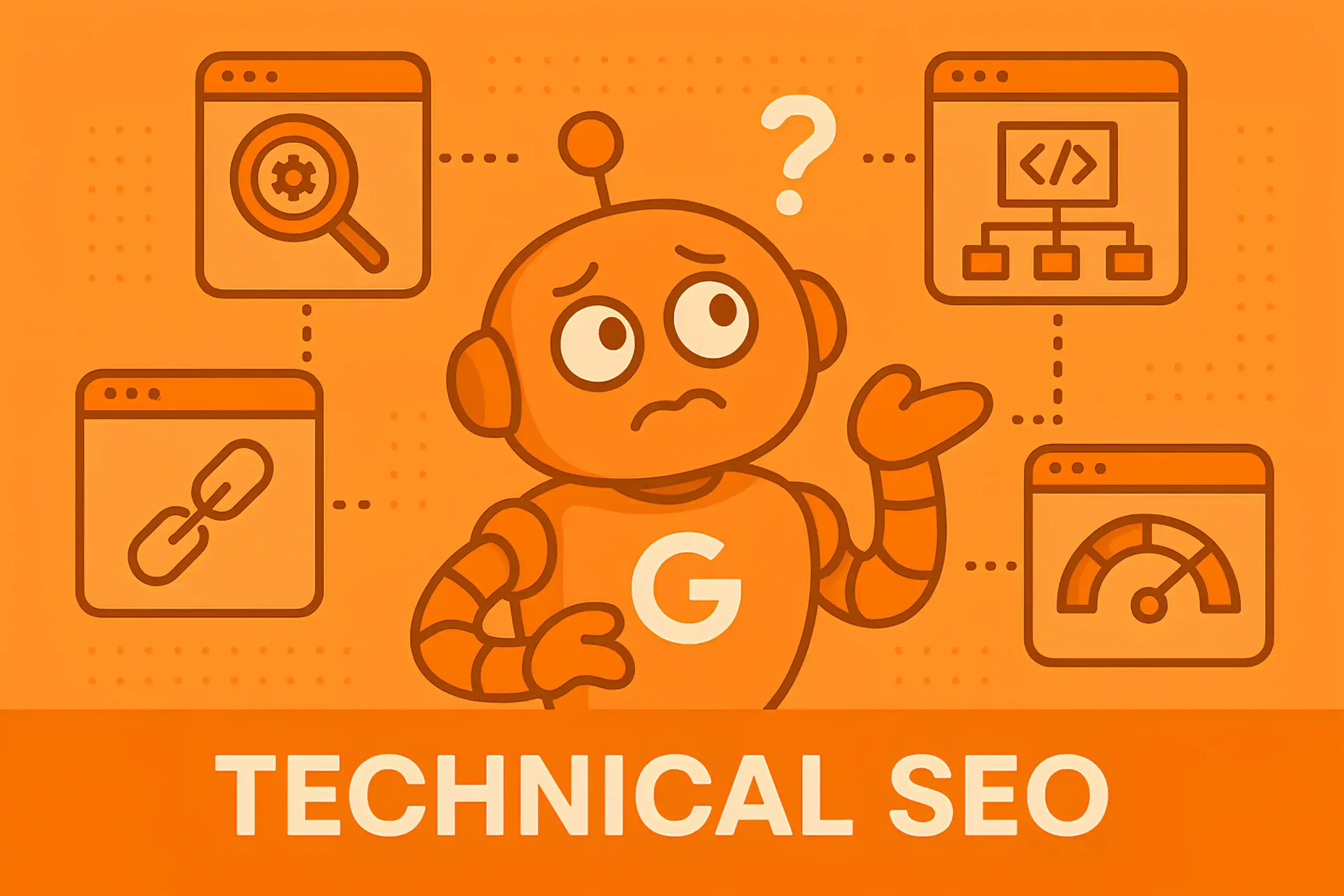
For more advanced audits, like log file analysis, crawl budget optimization, indexation deep-dives, or CMS-specific issues (e.g., Webflow SEO issues, JavaScript rendering issues, or custom-built eCommerce platforms), it’s common to see pricing jump to $1,000–$3,000+, especially for enterprise-level setups.
Same goes for large, complex websites. If you’re running a 10k+ page eCommerce store with filters, variants, and legacy tech, you’re paying for sharp eyes and deep experience.
On-page SEO is one of the core pillars of any proper SEO audit. Sure, almost every SEO will check your titles, meta descriptions, header tags, and image alt text. However, the cost of an on-page SEO analysis depends a lot on how far you want to go. If you’re only looking for a basic scan of the surface-level elements, it might stay in the $200–$500 range.
But if you’re after advanced things like keyword cannibalization, content overlap, intent mismatches, or figuring out why your product or blog pages aren’t ranking despite decent optimization, expect higher pricing, sometimes in the $700–$1,500+ range depending on the size of your site.
It’s impossible to talk about SEO seriously without talking about backlinks. They’re still one of the biggest ranking factors, and they can either support your growth or quietly ruin everything you’re trying to build. So, yeah, backlink profile audit is always included as part of a complete SEO audit package.

In terms of pricing, a basic backlink profile review for a small or medium site usually falls between $250–$600. For larger websites or deeper analysis, like checking toxic link risks, referring domain health, anchor text distribution, or link velocity patterns, you’re looking more in the $800–$1,500+ range.
If the audit includes disavow file preparation or competitive link-gap analysis, it may cost even more.
If you’re curious about what goes into pricing for the link-building side specifically, I also have a related guide on link-building cost you can explore right now.
Any serious SEO audit today should include a deep look at Google’s E-E-A-T signals. Especially with the rise of AI-generated content and more competition than ever, Google is relying harder on E-E-A-T to separate credible businesses from those just trying to game the system.
A reputable SEO agency or freelancer will often include E-E-A-T and overall reputation analysis as a core part of their audit. This is especially important if you’re doing SEO for healthcare providers or anything where trust is critical.

In those spaces, it’s not enough to have backlinks or decent content. Google wants to see real authority, accurate and helpful information, and clear signals that your site can be trusted.
Some providers might only glance at your backlink profile, but a proper E-E-A-T review goes beyond that. It looks at how your content is written (does it demonstrate real experience?), how secure and professional your site is (not just HTTPS, but overall user experience and credibility), and what the web is saying about you: your brand mentions, external reviews, and even your authorship signals.
I know I could’ve easily lumped content auditing under the broader umbrella of on-page SEO analysis, but I didn’t do that on purpose. Things like metadata, H1s, and headings are definitely part of the on-page checklist, but a detailed content audit is something much deeper.

A comprehensive content audit asks bigger questions: Does this content satisfy the search intent? Is it deep enough, useful enough, and clear enough to deserve traffic? Are the internal links supporting the user journey properly? Are there broken links, outdated stats, or irrelevant sections holding it back?
It becomes more time-consuming when you’re seeing traffic drops on specific blog pages. It takes time to dig through posts one by one, compare competitors, and figure out where things went off track.
So yes, it’s slow. But it’s also one of the most important parts of an SEO audit, and one that too many skip or oversimplify.
Finally, what’s the point of an SEO audit if you’re left with a bunch of jargon and no clue what to do next? Every detailed SEO audit, whether from a freelancer or an agency, should wrap up with clear, prioritized, and fully actionable recommendations.

Ideally, these recommendations should be delivered in a clean Google Sheet with priority levels, explanations, and suggested fixes for each point, so even someone outside of SEO can follow along. Some providers also include visual dashboards or diagrams built with third-party SEO tools to help paint a clearer picture of your current SEO health.
Your SEO partner should be ready to implement those changes, too, whether it’s technical fixes, on-page improvements, or content updates. Of course, that comes with extra costs, but if the audit is detailed enough, you’ll know exactly what you’re paying for and why it matters.
Sometimes, the terms “cheap” and “expensive” in SEO can be misleading. In my experience, if an SEO audit is comprehensive and backed by proven expertise, labeling it as expensive doesn’t quite fit. You’re paying for insight, analysis, and strategic clarity. If it helps you solve problems, uncover growth opportunities, and avoid costly mistakes, then the investment is more than justified.
That said, cheap is more complicated. Early in my SEO career, I offered affordable SEO services (Including SEO audits) on platforms like Upwork just to build my portfolio and get reviews. Even though the price was low, I poured serious effort into delivering quality.
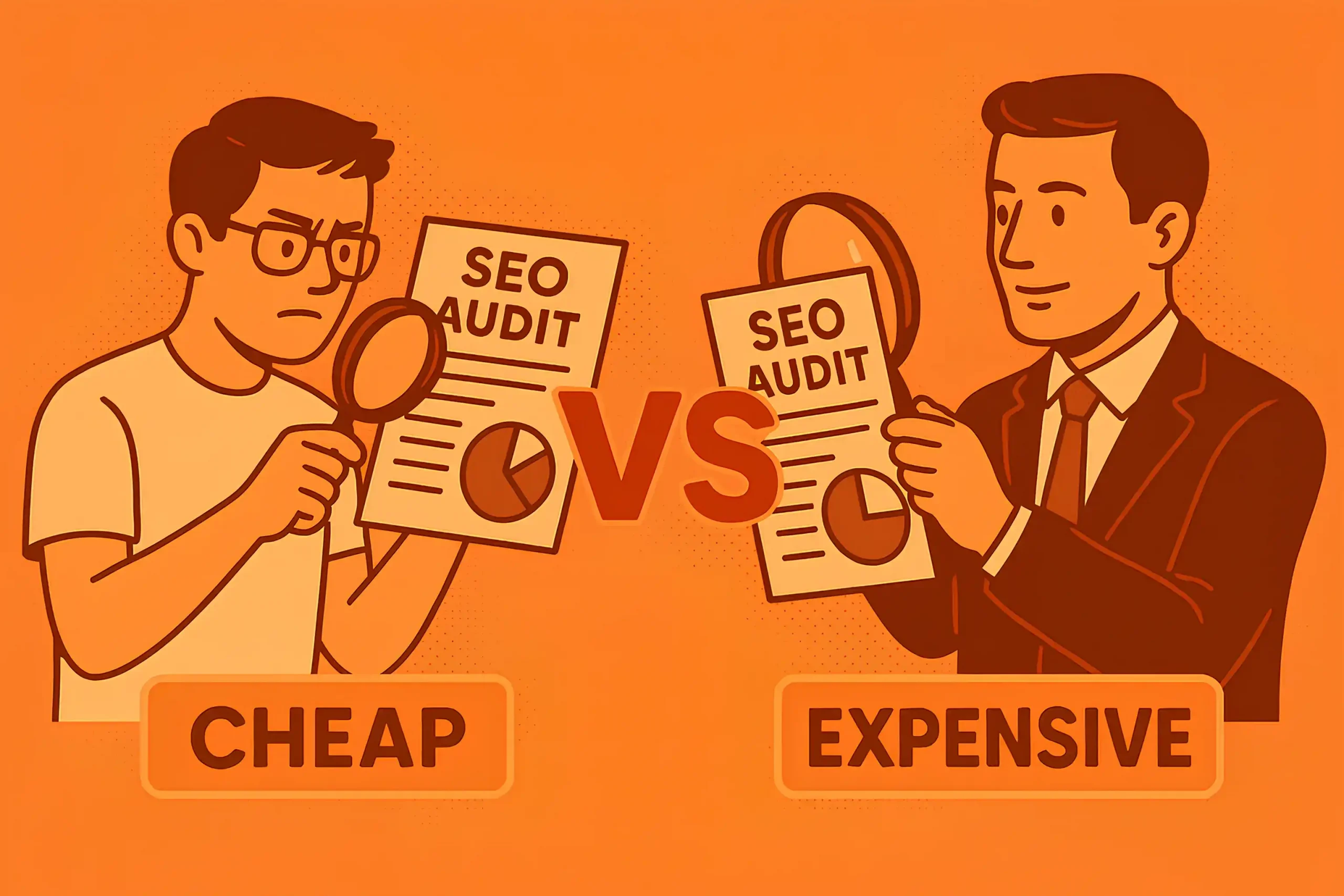
In those cases, it made sense for both me and the client. But when someone with little to no experience offers a $99 audit, with no case studies, no sample reports, no process transparency, it naturally raises red flags.
On the other hand, if you’re comparing several providers and one of them charges significantly more, you deserve to know why. What extra value are they bringing to the table? Are they running advanced crawls, reviewing Google E-E-A-T factors, evaluating your backlink profile in depth, or providing implementation support? Ask those questions. A higher cost should always come with clearer deliverables and deeper insights.
Don’t just compare prices; compare the thinking behind the audit, the depth of the deliverables, and the person or team behind the work. Whether it’s $100 or $1000, what matters most is whether the audit helps move your business forward.
SEO audits can be delivered by a wide range of providers, from solo freelancers to massive agencies. But knowing who to work with depends on your goals, your budget, and the level of insight you expect. Let me break it down.
Freelancers or SEO consultants are typically a great choice for small businesses or startups looking for flexible, cost-effective audits. The good ones often come with years of hands-on experience, and in some cases, you’ll get a more personalized, thoughtful audit than you’d get from a larger team.
If you’re hiring a freelancer or a fractional SEO consultant (great for an SEO audit), ask for recent examples of audits (not templates), what tools they use, and how they structure findings.
If you have an in-house SEO team, it’s okay to outsource SEO audits once a year to get a fresh perspective. It’s hard to critique your site objectively, and external SEO specialists often uncover blind spots that internal teams miss.
Agencies offer broader capabilities and can bring in multiple specialists: technical SEOs, strategists, content analysts, and link-building specialists, to contribute to your audit. Boutique agencies are typically more nimble, affordable, and client-focused. They often work closely with founders or CMOs and tailor the audit to your specific goals. These are ideal for SMBs, fast-growing startups, or companies that want direct communication and agile execution.
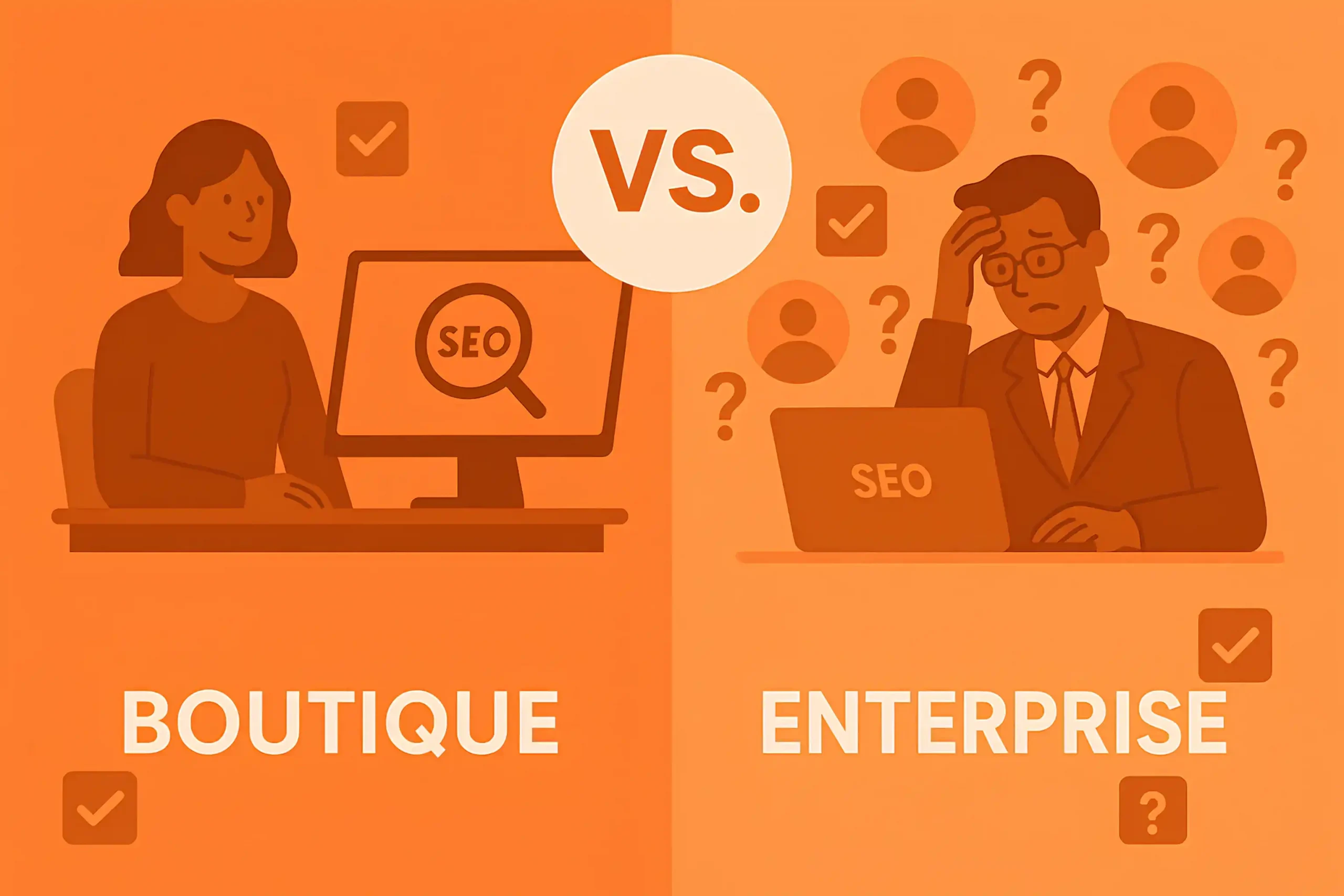
Big agencies, on the other hand, are made to handle large-scale work. If you’re running a site with thousands of pages, managing international domains, or need advanced audits (SEO + CRO + UX, etc.), this is the tier to consider.
Expect to pay more, but also expect structured communication, proprietary tools, and often access to services like implementation, training, and long-term strategy.
There’s never a wrong time to check your website’s health, but there are moments when postponing a full SEO audit is a risk you don’t want to take. I think one of the most common reasons to invest in a complete audit is when you’ve just launched a brand-new website, faced sudden traffic drops, or stuff like redesigns, domain migrations, or platform changes (say, moving from Shopify to WooCommerce).
Expanding to new markets is another moment that demands a closer look. Whether you’re targeting new regions, launching a multilingual site, or scaling content in a niche space, a full audit guarantees you’re aligned with your SEO foundation before investing time and money into growth.
There’s no shame in rolling up your sleeves and running a few free tools like Google Search Console, Screaming Frog, or Ahrefs’ site audit (if you’ve got access). If your site is small, relatively new, or you have at least some SEO knowledge, doing your own audit can give you a general picture of what’s going on. You’ll likely spot basic issues like missing meta descriptions, slow-loading pages, or some broken internal links.
A paid SEO audit may sound expensive at first, but it’s often the smarter investment, especially if your website is large, monetized, or mission-critical.
If you’re interested in SEO, another option is to take a comprehensive SEO course or hire an SEO coach to build the skills you need to handle audits better in the long run.
Some businesses start this way: They invest in training for someone on their team and slowly move from relying on agencies to building in-house capabilities.
So, is DIY saving you money? Only if you’re confident in what you’re doing and your site isn’t too complex. Otherwise, it’s often better to get a proper audit done, learn from it, and decide whether to outsource the fixes or handle them yourself going forward.
A few months ago, someone reached out to Digital World Institute for an SEO audit. I asked a simple question: “Why me?” Especially since I knew they had already spoken to a few well-known SEO agencies. He said, “Because you’re new. You probably don’t have 100 clients to manage, and I believe you’ll take my project seriously and dig deeper.”
What I mean is, sometimes, being new to the game or working solo means you’re more focused, more detail-oriented, and honestly, hungrier to do great work. So, try to find providers that are not running thousands of campaigns.

You need to look at how they work. Are they just relying on AI SEO services to generate automated reports, or are they really getting their hands dirty? If you get a report that looks like an export from Surfer or Screaming Frog without any real prioritization or explanation, it’s a red flag.
Also, ask for past examples. Ideally, in a similar business model to yours. I’m not saying they must’ve worked in your exact niche, but if you run an eCommerce store or a SaaS platform, they should at least have some understanding of the challenges that come with those.
If you’re an agency owner or consultant looking to scale, finding reliable white-label SEO audit services can save you hours while still delivering quality to your clients. But finding the right partner isn’t as simple as Googling and picking the first one that looks decent.
Start by asking to see samples of previous audits they’ve done. Do they offer fully white-labeled reports with clear, actionable insights? A good white-label SEO provider should explain issues clearly, prioritize fixes, and tailor the audit depth based on your client’s business model.
Make sure they can communicate with you in a way that makes the collaboration smooth. Ideally, the provider should also be open to supporting you post-delivery, especially if questions come up from your client.
Finally, pricing always plays a role. If you want a better understanding of how much it typically costs, what affects the price, and what kind of deliverables to expect, I’ve broken it all down in my guide on white-label SEO audit pricing. It’ll help you avoid overpriced bold claims and underpriced low-quality options.
Yes, and you absolutely should. A reliable SEO provider should be flexible enough to customize the audit scope based on your business model, goals, and current challenges. Whether you only need a backlink profile review, a technical crawl, or a deep content audit, a provider should offer custom options.
An SEO audit for eCommerce sites typically costs between $500 and $5,000, depending on the size of the store, number of SKUs, technical complexity, and depth of analysis required. Smaller shops using platforms like Shopify or WooCommerce with under 100 products may fall at the lower end, while larger stores with thousands of products, multiple categories, and international targeting will tend toward the higher end.
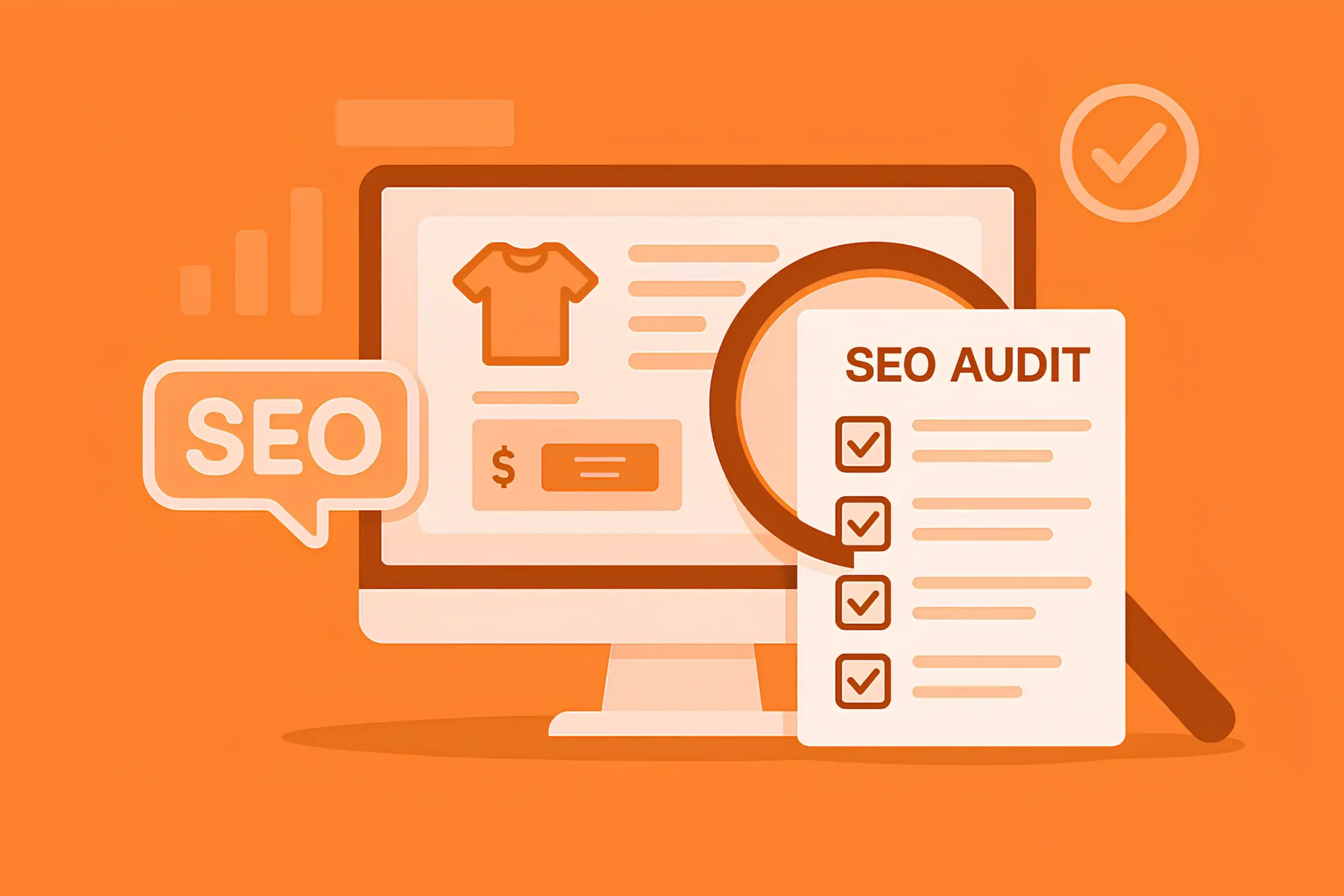
eCommerce audits often require more time due to unique elements like faceted navigation, duplicate content from filters, schema for products, and internal linking across product/category pages.
I think they’re great for geerall stuff (metadata, H1s, etc), but they don’t understand context, intent, or business objectives. For example, they might flag a page as having a low word count without realizing it’s a product page that doesn’t need long content.
They don’t know if your content satisfies search intent, if your internal linking makes sense, or if your site architecture is scalable.
A paid SEO audit usually takes anywhere from 5 days to 3 weeks, depending on the size and complexity of the website. For smaller sites (like local businesses with 10–20 pages), a well-structured audit can be completed in under a week. But for eCommerce, SaaS, or enterprise websites with hundreds or thousands of pages, expect it to take longer, sometimes 2–3 weeks or more.
Not always, but they should. Otherwise, it makes no sense to a client. The audit should come with a Google Sheet or dashboard that breaks down tasks by urgency and impact. In many cases, the same provider can offer to help implement the recommendations for an extra fee if you prefer not to do it all in-house. So yes, ask upfront if implementation plans are included before committing.
Of course, a comprehensive SEO audit should check for Google penalties, especially manual actions listed in your Google Search Console. If your audit provider doesn’t include this kind of check or doesn’t even ask for Search Console access, it’s a red flag.